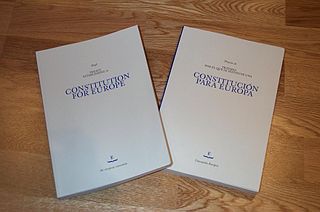Related Research Articles
A head of state is the public persona of a sovereign state. The specific naming of the head of state depends on the country's form of government and separation of powers; the head of state may be a ceremonial figurehead or concurrently the head of government and more.

The Statute of Westminster 1931 is an act of the Parliament of the United Kingdom that sets the basis for the relationship between the Dominions and the Crown.

A treaty is a formal, legally binding written agreement concluded by sovereign states in international law. International organizations can also be party to an international treaty.

The Westminster system, or Westminster model, is a type of parliamentary government that incorporates a series of procedures for operating a legislature, first developed in England. Key aspects of the system include an executive branch made up of members of the legislature, and that is responsible to the legislature; the presence of parliamentary opposition parties; and a ceremonial head of state who is separate from the head of government. The term derives from the Palace of Westminster, which has been the seat of the Westminster Parliament in England and later the United Kingdom since the 13th century. The Westminster system is often contrasted with the presidential system that originated in the United States, or with the semi-presidential system, based on the government of France.
A convention is an informal and uncodified tradition that is followed by the institutions of a state. In some states, notably those Commonwealth of Nations states that follow the Westminster system and whose political systems derive from British constitutional law, most government functions are guided by constitutional convention rather than by a formal written constitution. In these states, actual distribution of power may be markedly different from those the formal constitutional documents describe. In particular, the formal constitution often confers wide discretionary powers on the head of state that, in practice, are used only on the advice of the head of government, and in some cases not at all.

The Treaty establishing a Constitution for Europe was an unratified international treaty intended to create a consolidated constitution for the European Union (EU). It would have replaced the existing European Union treaties with a single text, given legal force to the Charter of Fundamental Rights, and expanded qualified majority voting into policy areas which had previously been decided by unanimity among member states.
A constitutional amendment is a modification of the constitution of a polity, organization or other type of entity. Amendments are often interwoven into the relevant sections of an existing constitution, directly altering the text. Conversely, they can be appended to the constitution as supplemental additions, thus changing the frame of government without altering the existing text of the document.
Ratification is a principal's legal confirmation of an act of its agent. In international law, ratification is the process by which a state declares its consent to be bound to a treaty. In the case of bilateral treaties, ratification is usually accomplished by exchanging the requisite instruments, and in the case of multilateral treaties, the usual procedure is for the depositary to collect the ratifications of all states, keeping all parties informed of the situation.

The president of the Republic of Trinidad and Tobago is the head of state of Trinidad and Tobago and the commander-in-chief of the Trinidad and Tobago Defence Force. The office was established when the country became a republic in 1976, before which the head of state was the Queen of Trinidad and Tobago, Elizabeth II. The last governor-general, Sir Ellis Clarke, was sworn in as the first president on 1 August 1976 under a transitional arrangement. He was formally chosen as president by an electoral college consisting of members of both houses of Parliament on 24 September 1976, which is now celebrated as Republic Day.
The Australian Government, also known as the Commonwealth Government or the Federal Government, is the national executive government of the Commonwealth of Australia, a federal parliamentary constitutional monarchy. The executive government consists of the prime minister and other ministers that currently have the support of a majority of members of the House of Representatives and in some contexts also includes the departments and other executive bodies that ministers oversee. The current executive government consists of Anthony Albanese and other Australian Labor Party ministers, in place since the 2022 federal election.

The state known today as Ireland is the successor state to the Irish Free State, which existed from December 1922 to December 1937. At its foundation, the Irish Free State was, in accordance with its constitution and the terms of the Anglo-Irish Treaty, governed as a constitutional monarchy, in personal union with the monarchy of the United Kingdom and other members of what was then called the British Commonwealth. The monarch as head of state was represented in the Irish Free State by his Governor-General, who performed most of the monarch's duties based on the advice of elected Irish officials.
Advice and consent is an English phrase frequently used in enacting formulae of bills and in other legal or constitutional contexts. It describes either of two situations: where a weak executive branch of a government enacts something previously approved of by the legislative branch or where the legislative branch concurs and approves something previously enacted by a strong executive branch.

The Statute of Westminster Adoption Act 1947 was a constitutional Act of the New Zealand Parliament that formally accepted the full external autonomy offered by the British Parliament. By passing the Act on 25 November 1947, New Zealand adopted the Statute of Westminster 1931, an Act of the British Parliament which granted full sovereign status and Commonwealth membership to the Dominions ratifying the statute. New Zealand was the last Dominion to do so, as the Dominion of Newfoundland voted to become a part of Canada in 1948.
The Treaty Clause of the United States Constitution establishes the procedure for ratifying international agreements. It empowers the President as the primary negotiator of agreements between the United States and other countries, and holds that the advice and consent of a two-thirds supermajority of the Senate renders a treaty binding with the force of federal law.

The monarchy of Grenada is a system of government in which a hereditary monarch is the sovereign and head of state of Grenada. The current Grenadian monarch and head of state, since 8 September 2022, is King Charles III. As sovereign, he is the personal embodiment of the Grenadian Crown. Although the person of the sovereign is equally shared with 14 other independent countries within the Commonwealth of Nations, each country's monarchy is separate and legally distinct. As a result, the current monarch is officially titled King of Grenada and, in this capacity, he and other members of the royal family undertake public and private functions domestically and abroad as representatives of Grenada. However, the King is the only member of the royal family with any constitutional role.

The Treaty of Lisbon is an international agreement that amends the two treaties which form the constitutional basis of the European Union (EU). The Treaty of Lisbon, which was signed by all EU member states on 13 December 2007, entered into force on 1 December 2009. It amends the Maastricht Treaty (1992), known in updated form as the Treaty on European Union (2007) or TEU, as well as the Treaty of Rome (1957), known in updated form as the Treaty on the Functioning of the European Union (2007) or TFEU. It also amends the attached treaty protocols as well as the Treaty establishing the European Atomic Energy Community (EURATOM).

The ratification of the Treaty of Lisbon was officially completed by all member states of the European Union on 13 November 2009 when the Czech Republic deposited its instrument of ratification with the Italian government. The Lisbon Treaty came into force on the first day of the month following the deposition of the last instrument of ratification with the government of Italy, which was 1 December 2009.
The royal prerogative is a body of customary authority, privilege, and immunity recognized in common law as belonging to the sovereign, and which have become widely vested in the government. It is the means by which some of the executive powers of government, possessed by and vested in a monarch with regard to the process of governance of the state, are carried out.

The Constitutional Reform and Governance Act 2010, or CRAG Act, is an Act of the Parliament of the United Kingdom on UK constitutional law which affected the civil service and the ratification of treaties, and made other significant changes. It extends to all parts of the United Kingdom.
In 2011, the government of the United Kingdom acknowledged that a constitutional convention had developed whereby the House of Commons should have an opportunity to debate the matter before troops are committed. It said that it proposed to observe that convention except when there was an emergency and such action would not be appropriate.
References
- ↑ The Constitutional Reform and Governance Act 2010 (Commencement No. 3) Order 2010
- ↑ R (Miller) v Secretary of State for Exiting the European Union , [2017] UKSC 5 at [58]; and s23(1) CRGA.
- ↑ See "Australia and International Treaty Making". Archived from the original on 16 December 2010. Retrieved 19 December 2010.Department of Foreign Affairs and Trade (accessed 19 December 2010)